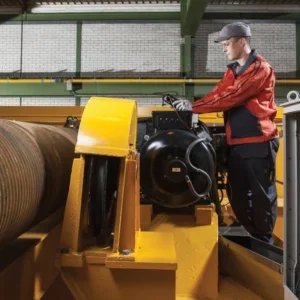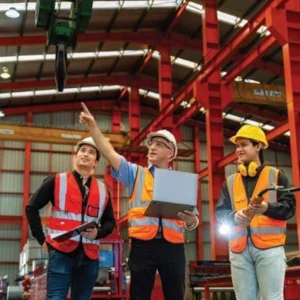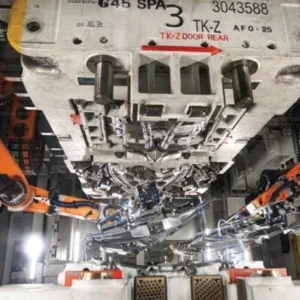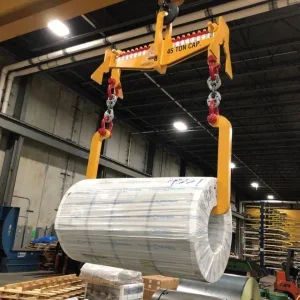A safe working environment is arguably the most essential starting point for any business in construction. Adhering to the latest health and safety guidelines while operating with a well-trained workforce is the ideal starting point for successful business practices.
However, getting the younger generation into training for careers in heavy industry such as manufacturing, printing or heavy lifting has been an ongoing issue for a large number of countries for many years. It’s no surprise then that manufacturers take the issue of training, both before, and on, the job, incredibly seriously. Without the next generation being trained up, the longstanding spectre of an ageing workforce looms large.
Supporting college departments and providing internships is one way that companies have been able to steer the best, and most capable students towards their industry, and in turn, benefit from the sort of research that can help them develop their business in the long term.
Cohesive approach
While this might not necessarily always take the form of offering training on the engineering or production side of business; certain companies support communications and marketing students in order to help develop their approach to building sales.
One manufacturer that regularly promotes the need for continued advancements in apprenticeship provision in this country is Konecranes, which is a keen advocate of theoretical classroom and also practical on-the-job training and
"Modern apprenticeship schemes have, over the last three decades at least, been seen as the poor relation to what many deem is the career path holy grail – a straightforward university degree. And what has happened during this time? Not only have we seen a skills shortage develop that has become more of a cavernous void, it can be aligned in part to the demise of manufacturing here in the UK," explains Pat Campbell, Konecranes’ director of Market Area – Europe West.
He adds: "What we want to show as living proof is that apprenticeship schemes are successful in not only creating highly-skilled, capable and intellectually gifted individuals that are of real benefit to a business, but that they create opportunities for real career progression and can help an individual go all the way to the top."
According to Konecranes, it has the impressive record of having a 100% track record in ensuring that apprentices upon completion of their training go into a full time job position.
Committed training
To date in 2014, Konecranes has appointed 10 new apprentices, seven of whom have joined the service operation, while the remaining three are located at the company’s crane manufacturing plant in East Kilbride.
The applicants will attend colleges for off-the-job training, the aim being to achieve NVQ Level 2 PEO (Performance Engineering Operations) while training will then be in accordance with the company’s existing apprenticeship programme.
Once this is completed, the apprentices will be qualified as service technicians, with a BTEC Higher National Certificate in electrical and electronic engineering. For those looking to progress further, the manufacturer has committed to support additional education and training schemes that includes the opportunity to embark on a degree course in certain aspects of engineering and business management.
Karen Winfield, HR director – Region Europe West at Konecranes explains: At Konecranes it is not just about giving our apprentices a job at the end of their four-year training period, it’s about putting them on a career path that can take them to the top of their profession. We have both senior managers and directors in our business that have gone through the apprenticeship programme in the past, so the scope for continued development not just here in the UK, but on a global basis, is very much a reality."
She adds: Our apprentices not only benefit from access to outstanding learning opportunities, they are remunerated in the process for their efforts, whilst being eligible for a range of fringe benefits that an employer such as Konecranes is capable of offering. "Should they then decide to progress to degree level, this delivers another significant advantage in that it is Konecranes who fund the process, so any form of student debt traditionally associated with a University degree is eliminated."
Practice-oriented
On the customer-facing front of training, Demag has officially opened its extensively refurbished training centre located in Wetter/Ruhr, Germany. Training courses on the safe use of cranes and hoists will be held at the facility, centred around a practice-oriented programme and focused on owners of installations and their employees.
Carolin Paulus, vice president of service at Terex Material Handling and responsible for Demag Service worldwide says the range of training for solid qualification is based on experience gained in continual dialogue with its customers.
"Our training programme is of modular design and can be flexibly adapted to individual requirements. Therefore, company-specific training courses are also possible," she explains.
The manufacturer’s new facility spans 1,00sqm and provides training "islands" for around 100 fully functional training models that comprise current Demag DR rope hoist and DC chain hoist range as well as older models that are still used in the wild.
With training the focal point of the new centre, senior Director Klaus Bohnet, head of Demag sales and service Germany, reinforces the issue that untrained staff can jeopardise the working environment.
"No-one should take this sort of risk, which is the responsibility of every owner of an installation," adding that a professional operator and product training for employees means that companies such as Demag Service can contribute to protecting people from accidents in the work environment, preventing damage to material and reducing liability risks.
Safety first
From another manufacturing perspective, overhead crane specialists Whiting Corporation has recently launched a new universal access control system that leverages smart card technology to prevent unauthorized use of fixed and mobile machinery.
AccessPoint from Whiting Passport is pitched as an inexpensive and easy-to-use way to help reduce the risks of equipment misuse that can include death and injury, while also compromising the safety of entire plant operations.
The system controls who can operate high-value, high-risk equipment but it also records when the person in question accessed it and also, for how long. This enables the user to employ one system for their entire operation, which is administered through a secure, easyto- use web-based application, Whiting Viewpoint.
Therefore, AccessPoint physically prevents unauthorized figures from using machinery that include overhead crane radio controls, overhead crane pendant controls, electrified below-the-hook special lifting devices, mobile cranes, jib cranes and small process cranes.
Unique features
Joel Phelps, product manager at Whiting Passport, explains: "AccessPoint is unique in that it controls and can record the who, how, when and where the equipment was used.
"The technology – which can also be used on any piece of fixed or mobile equipment besides cranes – is an inexpensive, easy-to-use way to significantly reduce the risks of equipment misuse, which can include death and injury, compromising of the safety of entire plant operations and also causing damage and disruption that drives up operating costs."
Specific uses
According to Phelps, each AccessPoint system is customized to each specific user, giving them the power to store start and stop times, to track certification and expiration statuses and to set customized re-certification intervals on a per user basis, as they see fit.
"Users can remain in compliance with OHSA and other regulatory standards because AccessPoint gives them the ability to continuously view how their equipment is being used. Users can quickly address and correct misuse patterns. AccessPoint creates a shared culture of responsibility that ensures the correct use of high risk, high value plant equipment."
The AccessPoint technology is claimed to differ "radically" from existing access control systems that are designed to control access to areas, governing perimeter access. Whiting Passport’s system puts engineering control between any high risk, high value equipment, stopping it being used by people who shouldn’t be running it.
"Unlike specialized perimeter systems designed to control and record access to areas or a single asset," says Phelps. "AccessPoint can be deployed across the entire enterprise for every range of fixed and mobile plant equipment, from a simple autoclave or process pump, to truly major items such as cranes, CNC lathes, molds, production automation and materials handling technology and expensive tracked vehicles, trucks and civil engineering equipment that could be lethal in the wrong hands."






